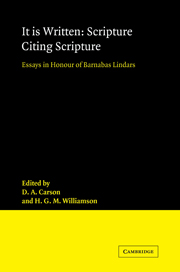Book contents
- Frontmatter
- Contents
- Preface
- Biographical note
- Abbreviations
- 1 An assessment of recent developments
- THE OLD TESTAMENT IN THE OLD TESTAMENT
- BETWEEN THE TESTAMENTS
- THE OLD TESTAMENT IN THE NEW TESTAMENT
- 11 Text form
- 12 Matthew
- 13 Mark
- 14 Luke/Acts
- 15 John and the Johannine Epistles
- 16 The Pauline literature
- 17 Hebrews
- 18 James, 1 and 2 Peter, Jude
- 19 Revelation
- Indexes
11 - Text form
Published online by Cambridge University Press: 16 January 2010
- Frontmatter
- Contents
- Preface
- Biographical note
- Abbreviations
- 1 An assessment of recent developments
- THE OLD TESTAMENT IN THE OLD TESTAMENT
- BETWEEN THE TESTAMENTS
- THE OLD TESTAMENT IN THE NEW TESTAMENT
- 11 Text form
- 12 Matthew
- 13 Mark
- 14 Luke/Acts
- 15 John and the Johannine Epistles
- 16 The Pauline literature
- 17 Hebrews
- 18 James, 1 and 2 Peter, Jude
- 19 Revelation
- Indexes
Summary
It is especially fitting to honour our colleague and friend Barnabas Lindars with an essay on the text form of the Old Testament in the New Testament, a subject to which he has himself contributed so much. It is also a pleasure to have this opportunity to wish him many more years of happy and fruitful work.
Investigation of text form is basic to any study of the use and role of the OT in the NT, beginning as it does with the task of isolating and identifying those elements in the text of the NT which we may suspect of being derived from the OT. In practice this means determining as precisely as the evidence will allow (1) whether the OT is in fact being referred to or reflected in a given NT passage, and if so (2) just how much of that passage is intended to be included in such a reference, (3) which (if any) known textual tradition or traditions of the OT are represented by the words in question, and (4) whether any deviation from known OT textual traditions finds attestation elsewhere in early Jewish or Christian literature or exegesis. The value of such information is great, not only for understanding the NT material investigated but also for our knowledge of the state of the OT text and methods of interpreting it in the first century of our era.
In this essay we shall look in detail at some of the problems raised by the examination of text form and aim to define more closely the criteria and methods by which that inquiry should proceed.
- Type
- Chapter
- Information
- It Is Written: Scripture Citing ScriptureEssays in Honour of Barnabas Lindars, SSF, pp. 193 - 204Publisher: Cambridge University PressPrint publication year: 1988

